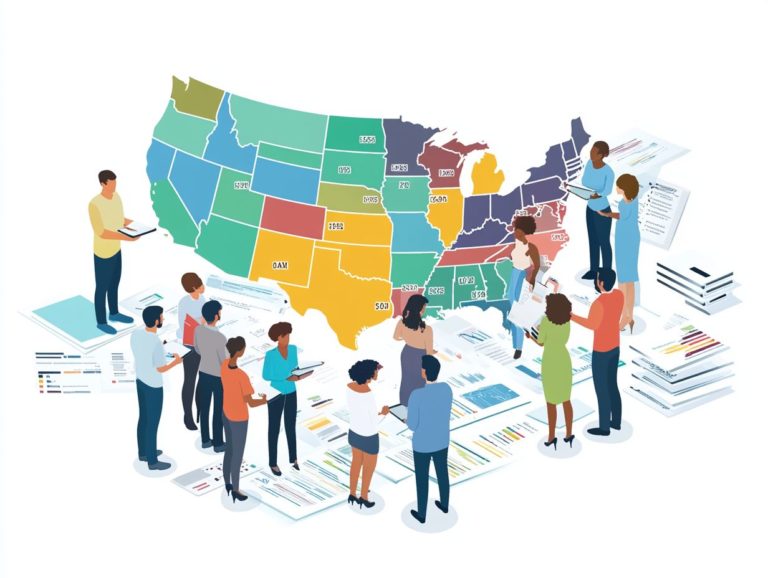A Guide to the Best Auto Insurance in Colorado
Navigating auto insurance in Colorado can feel daunting. However, understanding your options is vital for your finances and peace of mind.
This guide helps you understand Colorado s minimum coverage requirements. You’ll learn the implications of driving without insurance and the types of coverage available.
Discover tips for securing the best rates, insights into the claims process, and answers to common questions.
Whether you are a new driver or thinking about switching providers, this guide prepares you for what lies ahead.
Contents
- Key Takeaways:
- 1. Understanding Auto Insurance Requirements in Colorado
- 2. Factors to Consider When Choosing Auto Insurance in Colorado
- Tips for Finding the Best Auto Insurance Rates in Colorado
- 4. Understanding the Claims Process in Colorado
- 5. Frequently Asked Questions About Auto Insurance in Colorado
- Frequently Asked Questions
- What is auto insurance and why do I need it?
- What factors should I consider when choosing auto insurance in Colorado?
- What are the minimum coverage requirements for auto insurance in Colorado?
- Are there any discounts available for auto insurance in Colorado?
- Do I need additional coverage for my leased or financed vehicle?
- What should I do if I am involved in an accident in Colorado?
Key Takeaways:
- It’s mandatory to have at least the minimum required auto insurance in Colorado. This ensures financial protection and helps you avoid penalties.
- Factors like age, driving record, and location can impact your rates. Compare quotes from top companies to find affordable coverage.
- To find the best auto insurance rates, take advantage of discounts and compare quotes from different companies.
1. Understanding Auto Insurance Requirements in Colorado
Understanding auto insurance requirements is crucial for drivers. It ensures compliance with state laws and protects you from financial risks on the road.
Colorado has specific minimum coverage types that you must know, making it essential to get to know various insurance policies and their implications for your safety and financial well-being.
With options ranging from liability coverage to comprehensive plans, you need to evaluate your unique needs. Comparing insurance companies helps you find the best car insurance that meets both legal standards and your personal preferences.
Consider factors such as your driving habits and insights from industry studies to guide your choices.
In Colorado, the law mandates a minimum liability coverage of $25,000 for bodily injury per person, $50,000 for total bodily injury per accident, and $15,000 for property damage. Knowing how these minimums affect your insurance rates is crucial, as higher coverage limits can significantly influence your premium costs.
Many drivers in the state find that rates can vary widely based on the type of coverage chosen, with comprehensive plans typically carrying a higher price tag.
Consider the financial strength of insurance providers. Ratings from AM Best indicate how well a company can pay claims. Customer satisfaction metrics from J.D. Power and the Better Business Bureau provide insights into service quality an important factor that can greatly affect the claims process during challenging times.
Balancing these considerations will enable you to make informed decisions that align with both legal requirements and your personal financial safety.
What Are the Minimum Coverage Requirements in Colorado?
In Colorado, the minimum coverage requirements for auto insurance ensure you uphold a baseline level of financial responsibility, primarily through liability, comprehensive, and collision coverage.
Liability coverage is your safety net, protecting others if you re at fault in an accident. It covers both bodily injury and property damage, helping to cover medical expenses and vehicle repairs for the other party, up to the limits set by the state.
On the flip side, comprehensive coverage is your shield against non-collision-related incidents like theft, vandalism, or natural disasters, making it essential for navigating a variety of unforeseen situations.
Collision coverage, meanwhile, helps you repair or replace your own vehicle after an accident, regardless of who s at fault. This ensures that you have peace of mind and financial security in potentially costly predicaments.
What Are the Penalties for Driving Without Insurance in Colorado?
Driving without insurance in Colorado can lead to serious penalties that could hit you hard. You may face substantial fines and legal repercussions that can tarnish your record and affect your financial health.
These consequences include immediate financial penalties that can soar into the thousands. Additionally, you could face license suspensions that severely limit your ability to commute.
When you eventually try to reinstate your driving privileges, you ll likely encounter higher insurance rates, as insurers typically view driving without coverage as a significant risk. This could lead to significant financial stress!
What Are the Additional Insurance Requirements for Colorado Drivers?
Beyond the basics of minimum coverage, consider enhancing your financial security on the road. You can choose additional insurance options such as uninsured motorist coverage and personal injury protection.
These options provide essential financial backing in accidents involving uninsured drivers or when medical costs arise from injuries sustained during a collision. For example, opting for uninsured motorist coverage is especially beneficial if you frequently navigate bustling, high-traffic areas where the risk of encountering negligent drivers is higher.
Personal injury protection is a smart choice for those who may face significant medical expenses or have families that depend on them for support.
By carefully evaluating your individual circumstances such as your driving habits and financial situation you can customize your insurance to better shield yourself from potential risks. This ensures a sense of peace as you travel.
2. Factors to Consider When Choosing Auto Insurance in Colorado
Choosing the right auto insurance in Colorado requires thoughtful evaluation of several key factors. Consider the types of coverage available, the financial strength of insurance providers, and how your personal circumstances can impact premium rates. For a comprehensive review, check out the top 5 auto insurance choices in Denver.
It’s essential to research various policy options, such as usage-based insurance, collision coverage, and liability coverage. Understanding how your driving habits and records affect insurance costs is equally important.
Many companies offer discounts or bundled policies that can lead to significant savings while ensuring you have adequate coverage.
Recognizing the distinctions between types of coverage is crucial. Liability insurance protects you against claims for bodily injury and property damage, while collision coverage covers damages to your vehicle during an accident. Comprehensive coverage protects against non-collision incidents like theft or weather-related damages.
Your age, driving experience, and location can significantly influence your premium rates, often resulting in a wide range of costs among different providers.
Among Colorado s leading auto insurance companies, those with stellar customer reviews prioritize personalized service and innovative coverage options, making them the preferred choice for many drivers.
What Are the Different Types of Coverage Available in Colorado?
In Colorado, you have various coverage options, including liability coverage, comprehensive coverage, collision coverage, and innovative choices like usage-based insurance. Each type protects you in different scenarios.
- Protect yourself with liability coverage: This is essential to meet the state s legal requirements while ensuring you re safeguarded in the event of an accident you cause.
- Safeguard against theft with comprehensive coverage: This protects you against non-collision incidents, making it a smart choice if you live in an area prone to such events.
- Cover repair costs with collision coverage: This steps in when you re at fault, covering repair costs for your vehicle after an accident especially beneficial for those who own a new car.
- Save on premiums with usage-based insurance: This is perfect for tech-savvy individuals seeking to adjust their premiums based on how much and how safely they drive.
Don’t wait review your auto insurance options today!
How Do Personal Factors Affect Auto Insurance Rates in Colorado?
Personal factors play a significant role in shaping your auto insurance rates in Colorado. Elements like your driving habits, driving record, and demographic characteristics all contribute to how your premiums are calculated.
Insurance companies closely examine your driving record to uncover patterns of behavior. They evaluate aspects such as the frequency of accidents and traffic violations. The number and history of claims you ve made are crucial indicators that signal potential future risk to insurers.
Demographic factors, such as your age and where you live, also carry weight. For example, younger drivers often face higher rates due to perceived inexperience, while those in urban areas may see increased premiums due to a greater likelihood of accidents.
When combined, these factors create a comprehensive picture that insurers use to customize your insurance rates.
What Are the Top Auto Insurance Companies in Colorado?
Identifying the top auto insurance companies in Colorado means evaluating customer satisfaction ratings, coverage options, and financial stability. Names like:
- Geico
- State Farm
- USAA
- Southern Farm Bureau
- American Family Insurance
These companies stand out not just for their impressive offerings but also for their exceptional customer service and streamlined claims processes. They prioritize quick resolutions and seamless communication.
They provide unique coverage options tailored to meet the diverse needs of Colorado drivers, such as protection against wildlife collisions a relevant concern in the mountainous regions. Their digital management tools make your experience easier, allowing you to manage your policies effortlessly.
This combination of reliability, innovative offerings, and strong community engagement makes these insurers appealing choices for drivers throughout the region.
Tips for Finding the Best Auto Insurance Rates in Colorado
Ready to find the best auto insurance rates? Let s dive in!
Finding the best rates requires thoughtful research and comparison among various insurance companies. Focus on available discounts and understand how premium rates are structured.
To maximize your search, consider enrolling in safe driving programs, like USAA’s DriveSafe & Save, which rewards you with significant discounts for safe driving. You might also think about raising your deductibles to effectively lower your monthly premiums. If it aligns with your needs, opting for a minimum-coverage policy could also be a smart move.
Another valuable tactic is to request and compare quotes from different insurers. This helps you pinpoint the best offers while accounting for all potential discounts and benefits. By adopting this approach, you can achieve substantial savings without sacrificing essential coverage.
How Can One Qualify for Discounts on Auto Insurance in Colorado?
In Colorado, you can get various discounts on auto insurance by practicing safe driving, participating in programs that track your driving habits, and bundling your policies with insurance providers.
These discounts can significantly reduce your overall premium costs, making auto insurance much more budget-friendly. For example, if you maintain a clean driving record, you re likely to snag safe driver discounts, which reward your responsible driving habits.
Many insurers also offer loyalty programs that can lead to extra savings for long-term customers, providing an incentive to stick around. Bundling your auto insurance with other policies, like home or renters insurance, typically results in even more reductions.
By employing these strategies, you can collectively achieve substantial savings, easing the financial burden of essential insurance coverage.
Don t wait! Start comparing quotes today to save on your auto insurance.
What Are Some Ways to Lower Auto Insurance Premiums in Colorado?
Lowering auto insurance premiums in Colorado can be your reality with some smart choices. Consider increasing your deductibles (the amount you pay out of pocket before insurance kicks in), opting for minimum coverage policies, and maintaining a pristine driving record.
Don’t underestimate the power of shopping around for quotes from various insurance providers. This ensures you discover the most competitive rates available. By taking advantage of discounts whether for safe driving, bundling policies, or being a member of certain organizations you can further trim those costs.
It’s also wise to regularly review your coverage needs. This way, you avoid being over-insured or paying for unnecessary extras. Periodically assessing your policy will help align your coverage with your current circumstances, ultimately leading to even more savings on those premiums.
How Can One Compare Quotes from Different Auto Insurance Companies in Colorado?
Comparing quotes from various auto insurance companies in Colorado is crucial to finding the best auto insurance rates and coverage options tailored to your unique needs and preferences.
As you embark on this journey, it’s important to understand that focusing solely on the price may cause you to overlook essential elements of a policy. Coverage details, such as liability limits, deductibles, and specific inclusions, can significantly influence the overall effectiveness of your auto insurance plan.
Taking a closer look at customer reviews gives you valuable insights into the insurer’s reputation and reliability, shedding light on how they manage claims and customer service. By investing time to assess these factors along with price, you can make a more informed decision that not only fits your budget but also ensures you have the necessary protection on the road.
4. Understanding the Claims Process in Colorado
Understanding the claims process in Colorado is essential for achieving a seamless and efficient resolution after an accident, enabling you to navigate the intricacies of auto insurance with confidence.
The very first step after an accident is to meticulously document the scene. This means snapping photos of any damage, gathering witness statements, and noting the time and location of the incident. After ensuring everyone’s safety and calling emergency services if needed, your next priority should be to contact your insurance company. Be prepared to offer detailed descriptions of what happened and share all the evidence you’ve collected.
Once your claim is filed, the insurance company will delve into the details before determining the compensation amount. It’s crucial to avoid common pitfalls, like providing incomplete information or not fully understanding your policy s coverage limitations. These missteps can significantly delay your resolution.
What Should One Do After an Accident in Colorado?
After an accident in Colorado, it’s crucial to act quickly and effectively. Take specific steps to document the incident, report it to your insurance company, and initiate the claims process without delay.
- Start by gathering crucial information from all parties involved names, contact details, insurance information, and license plate numbers.
- Don’t underestimate the power of visuals; take photos of the accident scene and the vehicles involved, as this evidence can be pivotal in resolving claims.
- If there are injuries or significant property damage, filing a report with local law enforcement may be necessary. This can further support your claims process.
By remaining calm and collecting as much information as possible, you’ll pave a smoother path to recovery for everyone involved. Take these steps promptly to ensure the best outcome!
How Does the Claims Process Work in Colorado?
The claims process in Colorado is designed to ensure you receive fair treatment and a timely resolution after filing a claim with your insurance company.
This well-structured system starts with notifying your insurer about the incident. Provide all the necessary information and documentation. Once your claim is submitted, an adjuster will be assigned to evaluate the extent of the damage or loss. They will often reach out for additional details or evidence to assess the validity of your claim.
During this phase, clear communication is essential. Insurers usually keep you informed about the status of your claim, outlining any further requirements you may need to fulfill. After the evaluation is complete, the insurance company will determine your coverage and compensation, guiding you toward a final resolution.
Avoid These Common Claims Mistakes in Colorado!
During the claims process, you may encounter pitfalls that could hinder your chances of receiving fair compensation.
One prevalent mistake is neglecting to document the accident thoroughly. This oversight can create gaps in your case and undermine your claim. Many people also struggle to fully understand what their insurance covers, leading to unrealistic expectations about what expenses are actually included.
To sidestep these challenges, it s crucial to take detailed notes at the scene. Capture photographs of damages and gather contact information from witnesses. Review your insurance policy in depth before any incident arises to clarify coverage limits and benefits. This will ensure you’re well-prepared to navigate the claims process with confidence.
5. Frequently Asked Questions About Auto Insurance in Colorado
Frequently asked questions about auto insurance in Colorado typically focus on essential topics such as the average cost of coverage, the factors that influence auto insurance rates, and how to manage high-risk drivers within state regulations.
Grasping these key points can make a huge difference in your insurance costs! Costs can fluctuate significantly based on your unique circumstances. For instance, if you have an impeccable driving record, you may find that your rates are considerably lower compared to someone with multiple claims or a history of violations.
High-risk drivers, who often face higher premiums, should seek specialized options designed to provide them coverage despite past challenges. Make it a priority to evaluate coverage limits carefully to ensure they provide comprehensive protection without placing an undue financial burden on you.
By comparing quotes, assessing policies, and asking specific questions, you can make informed decisions that align perfectly with your needs as a driver in Colorado. Take action now to protect your interests!
What Is the Average Cost of Auto Insurance in Colorado?
The average cost of auto insurance in Colorado can fluctuate based on several factors, including your profile as a driver, the type of coverage you choose, and the insurance company you select.
Insurance premiums vary depending on the coverage type whether it’s liability, comprehensive, or collision coverage. For instance, if you opt for comprehensive coverage, you might encounter higher premiums compared to those who only choose liability. A clean driving record often translates to lower rates, while younger drivers and those living in urban areas might experience elevated costs due to increased risk factors.
Each of these elements plays a role in determining the overall cost. It’s crucial for you to evaluate your individual circumstances and compare multiple quotes to secure the best deal.
What Are the Top Factors That Affect Auto Insurance Rates in Colorado?
Several key factors shape auto insurance rates in Colorado, including your driving habits, claims history (the record of any claims you have made on your insurance), and demographic details such as your age and location.
Understanding these influences enables you to take actionable steps toward lowering your premiums. For example, maintaining a clean driving record is essential. Repeated violations or accidents can lead to significant spikes in your rates. The frequency and severity of past claims can also impact your premiums, prompting you to consider raising deductibles to minimize the likelihood of future claims.
Demographic factors, like your age and where you live, are similarly crucial. Young drivers or those residing in high-traffic areas typically face higher costs.
By proactively engaging in safe driving practices, monitoring your claims, and reassessing your coverage options, you can effectively alleviate the financial strain of rising insurance rates.
How Can One Find the Best Auto Insurance for High-Risk Drivers in Colorado?
Finding the best auto insurance for high-risk drivers in Colorado often demands careful comparison of different insurance companies and specialized coverage options.
Navigating the world of auto insurance can feel overwhelming, particularly for those labeled as high-risk due to previous accidents or traffic violations. Take time to request quotes from several companies to find the best deal! Rates can fluctuate dramatically between insurers. By understanding the specific risks that contribute to higher premiums, you can enable yourself to make informed decisions.
Exploring state-sponsored insurance programs can provide a vital safety net, ensuring that even with a challenging driving history, you still have access to affordable coverage options.
What Are Some Tips for Choosing the Right Coverage Limits in Colorado?
Choosing the right coverage limits in Colorado is crucial for ensuring you have adequate protection against financial liabilities while also meeting legal requirements and addressing your personal safety needs.
To effectively assess your insurance needs, consider your driving habits how often you are on the road, your mileage, and any history of accidents. Your assets, including property and savings, significantly influence how much coverage you should have to safeguard against potential risks.
Evaluating the specific risks you might face, such as heavy traffic, severe weather, or high theft rates in your area, will help you understand the level of protection you truly need.
It is important to strike a balance between cost and coverage. While lower premiums may seem enticing, inadequate protection could result in substantial financial burdens if an accident occurs. Prioritizing the right coverage ensures that you are not just saving money but also securing your peace of mind.
Frequently Asked Questions
What is auto insurance and why do I need it?
Auto insurance is a contract between you and an insurance company that protects you financially in the event of an accident or theft involving your vehicle. It covers the cost of repairs or replacement of your car, as well as any medical expenses or liability costs. In Colorado, you must have at least liability coverage for your vehicle by law!
What factors should I consider when choosing auto insurance in Colorado?
When looking for the best auto insurance in Colorado, it is important to consider factors such as coverage options, pricing, customer service, and the company’s financial stability. You should also consider your own driving habits and needs, as well as auto insurance coverage for Colorado residents that may affect your insurance options.
What are the minimum coverage requirements for auto insurance in Colorado?
In Colorado, the minimum required coverage for auto insurance is liability coverage of $25,000 for bodily injury per person, $50,000 for bodily injury per accident, and $15,000 for property damage. However, it is recommended to have higher coverage limits and additional coverage options, such as collision and comprehensive, for better protection.
Are there any discounts available for auto insurance in Colorado?
Yes, there are various discounts available for auto insurance in Colorado. These may include discounts for safe driving, multiple policies with the same company, low mileage, good student discounts, and more. It is important to ask your insurance provider about any potential discounts you may qualify for.
For more information, contact your insurance agent or visit relevant websites that can assist you in finding the best auto insurance options available!
Do I need additional coverage for my leased or financed vehicle?
If you re leasing or financing a vehicle, your lender likely requires you to have specific insurance. This includes insurance that covers accident damage and theft, in addition to basic liability coverage.
Don t wait! Check with your lender today to ensure you have the right coverage!
What should I do if I am involved in an accident in Colorado?
If you find yourself in an accident, prioritize safety. Make sure everyone is okay and call for medical help if needed.
Next, exchange info with the other driver and document the scene. Contact your insurance provider right away to report the accident and learn how to file a claim.





